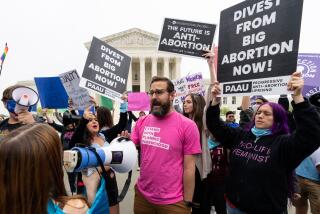Another Warning to Schools
The U.S. Supreme Court has decided, for the moment, to sidestep a clear statement on school vouchers. But even the court’s non-decision last week in a Wisconsin case will probably send a powerful message: Unless public schools in California and around the nation improve, more parents will try to abandon them.
The court last week rejected a challenge to a Wisconsin law that gives low-income parents up to $4,900 per year for private or parochial schooling in Milwaukee. On an 8-1 vote without a written ruling, the justices dismissed appeals from teachers unions and the American Civil Liberties Union, which argued that direct state aid violates the Constitution’s separation of church and state.
Over the last decade, the high court has edged away from the doctrine of strict church-state separation. In a series of decisions, it has permitted some religious activities on public school campuses, such as after-school Bible study, and permitted federally funded tutors to teach in parochial schools.
The one-line order in the Wisconsin case does not set a binding national precedent, but it does, in effect, permit the program there to continue. Its voucher cap of $4,900 is the amount the state spends for each pupil in Milwaukee’s public schools. About 6,200 parents are taking the option this year.
The court’s action is likely to encourage more experimentation with vouchers elsewhere. Parents are increasingly impatient with public schools that are failing their children. One measure of the depth of that frustration is the endurance of the voucher idea. Cleveland operates a program similar to Wisconsin’s, and other cities are experimenting with privately funded voucher programs. Newly elected Florida Gov. Jeb Bush and reelected Texas Gov. George W. Bush both have spoken in support of public vouchers.
While voters in other states, including California in 1993, have turned down voucher initiatives, those defeats may speak as much to defects in the ballot measures as to concern that voucher programs would rob public schools of money while subsidizing religious instruction, as well as subsidizing the parents who best know how to work the system. Vouchers are not a broad-based solution to what ails public education. This newspaper does not favor vouchers, at least not now, but it is hard to deny their attraction to parents.
If nothing else, the Supreme Court’s decision puts poor teachers and indifferent school administrators on notice: The voucher idea won’t go away until the public schools get demonstrably better.
More to Read
Sign up for Essential California
The most important California stories and recommendations in your inbox every morning.
You may occasionally receive promotional content from the Los Angeles Times.










